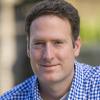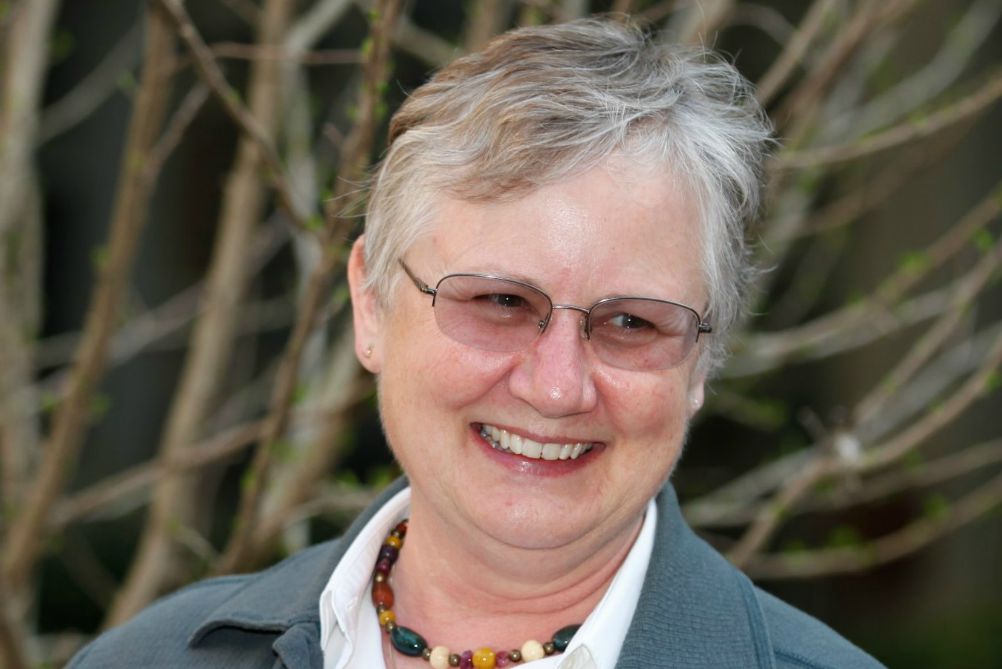
Mary Gautier, who joined the Center for Applied Research in the Apostolate (CARA) in 1998, is pictured in a recent photo. (Courtesy of CARA)
Mary Gautier has spent two decades trying to explain the Catholic Church to itself.
As bishops, priests and diocesan staff struggle to address the clergy abuse crisis, grapple with demographic changes and fret about Mass attendance, the senior researcher at the Center for Applied Research in the Apostolate (CARA) has often been the first person called on to deliver sociological research without fear or favor. A common thread runs through Gautier's prodigious volume of work, which includes five hundred research reports, more than a hundred presentations, and a dozen books. "My whole career has been about the long view and looking at trends," said Gautier, who is retiring from CARA after 21 years.
Soft-spoken and unassuming, Gautier earned a national reputation for politely puncturing conventional wisdom, reminding church officials, academics and religion journalists that when it comes to the standoff between data and nostalgia, the numbers tell the truth. This unadorned approach grew out of Gautier's practical experience working for six years in the 1980s as a lay pastoral minister at St. George, a suburban parish in Baton Rouge, Louisiana, while raising two children and going to school at Louisiana State University. She returned to LSU to complete her undergraduate degree in sociology and religious studies, later earning a master's degree and then a doctorate in sociology from the university.
Gautier was first introduced to CARA's research at St. George by "a very forward-looking Vatican II pastor," as she described him. The same priest also told her about the late Catholic University of America sociologist Dean Hoge, a major influence on Gautier's career. In particular, two of Hoge's books, Converts, Dropouts, and Returnees: A Study of Religious Change Among Catholics and The Future of Church Leadership: Responses to the Priest Shortage, made a deep impression. Reports put out by CARA and Hoge's work, Gautier said, "sparked my imagination and opened my eyes to the realization that you could use social science to provide answers and help dispel myths."
When Gautier moved to Washington, D.C., and joined the organization in 1998, she learned about the work of Jesuit sociologist Fr. Joseph Fichter, who helped desegregate Catholic parishes in the South. The first volume of his Southern Parish series, Dynamics of a City Church, published in 1951 and considered a classic study of church sociology, deepened her interest in asking probing questions that got beyond surface-level assumptions.
Advertisement
Fichter was one of the first researchers to study Catholics' connections to their parishes, finding that even in the 1950s — often viewed as the golden era of American Catholicism — a significant percentage of Catholics had only marginal ties to their parish and had spotty Mass attendance. "I found that fascinating, and for my whole life I've been exploring that question of what church membership and Mass attendance actually means," Gautier said.
Another dominant narrative that doesn't withstand empirical scrutiny, she notes, is the discourse around priest shortages in the United States. Gautier has been studying seminarians for a long time. The number of men in graduate studies for priesthood, around 2,500 to 3,000 every year, has been "rock solid" for two decades. "We have had a steady and stable group of men preparing for priesthood, but for 20 years but we've been saying we have a priest shortage," Gautier said. "The truth is we're measuring ourselves against an artificial bubble that happened in the 1950s, '60s and early '70s. We're constantly measuring ourselves against an anomaly."
It's that ability to deliver a sober assessment grounded in facts — always anchored in a deep love for the church — that draws appreciation from everyone, including reporters and bishops.
"We have had a steady and stable group of men preparing for priesthood, but for 20 years but we've been saying we have a priest shortage."
—Mary Gautier
"The Catholic Church has too often been managed by the power of a single anecdote rather than the reality of data," said veteran religion journalist David Gibson, director of the Center on Religion and Culture at Fordham University. "Mary has been critical in helping to provide a clear-eyed look at the trends and dynamics shaping Catholicism. Even if church leaders didn't always heed her voice, we journalists were most certainly happy to call her, and remain in her debt. Mary will be missed in retirement, but it's my hope that this moment may be one that prompts the Catholic bishops and others in positions of church leadership to think about committing resources to the kind of work that she and CARA do. It would be the best investment, one with a huge potential return."
Stephen Schneck, a retired professor who directed the Institute for Policy Research and Catholic Studies at the Catholic University of America, praised her "scholarly generosity" over the years. He described Gautier as "my go-to person for separating the real facts about Catholics in America from rose-tinted nostalgia and culture-war spin."
Bishop Shawn McKnight of Jefferson City, Missouri, worked with Gautier on CARA's annual surveys of newly ordained priests and newly professed religious, along with the organization's annual surveys of diaconate directors, and a major national survey of young Catholics on vocations. "It was a sheer delight to work with Mary, a professional woman of deep Catholic faith," McKnight said. "It was so helpful to have her insights based on hard data and her knowledge of the church to help steer some very significant pastoral planning."
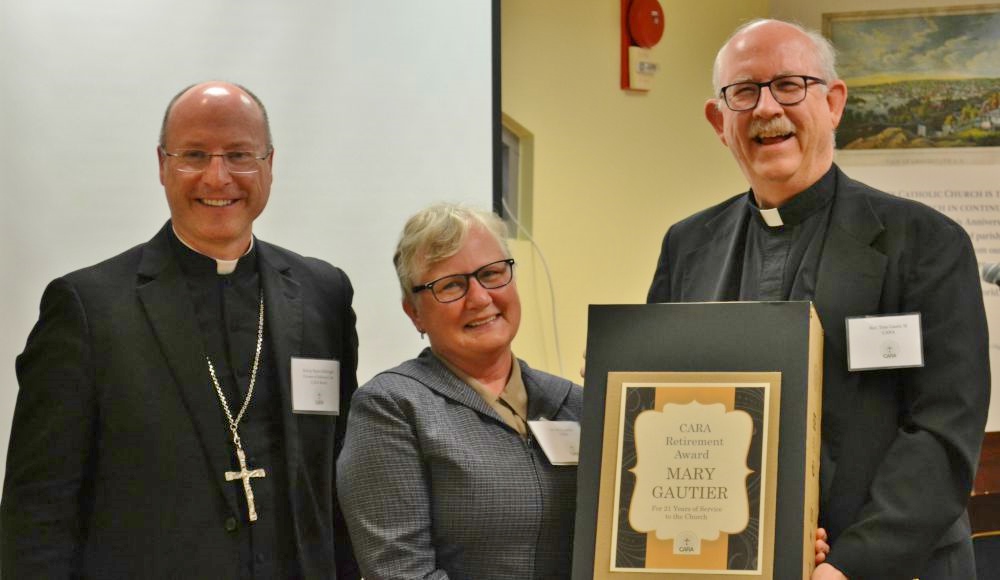
Bishop Shawn McKnight of Jefferson City, Missouri, chair of CARA's board of directors, Mary Gautier, CARA senior researcher, and Jesuit Fr. Tom Gaunt, executive director of CARA, at Gautier's retirement event Oct. 28 (Courtesy of CARA)
Unfiltered data
The Center for Applied Research in the Apostolate, usually known by its acronym, is a product of the Second Vatican Council. Founded in 1964, a year before the council ended, CARA was the brainchild of Cardinal Richard James Cushing, who led the Boston Archdiocese for nearly three decades. Cushing recognized the need for an organization, independent of episcopal interference but dedicated to the church's advancement, that could provide unfiltered data that would help inform the church's myriad ministries. The non-profit center, affiliated with but not funded by Georgetown University, produces troves of research data for clients that include the U.S. Conference of Catholic Bishops, dioceses, parishes and Catholic universities. Gautier is the longest serving employee in the organization's history.
"Mary has a very grounded way of looking at research because it arose from her lived experience rather than just ideas," said Jesuit Fr. Tom Gaunt, executive director of CARA. When the U.S. bishops' conference started the process of institutionalizing a response to the clergy abuse crisis after a landmark 2004 national meeting in Dallas, CARA was tapped as an auditor to collect annual data from dioceses around the country as part of the bishops' Charter for the Protection of Children and Young People. "When the bishops said, 'How are we going to do this?' Mary said, 'Here is the way.' No one had done this before. Her dedication and persistence to get it right was really an extraordinary effort on her part," Gaunt observed.
Her expertise also drew attention outside the United States. When the Australian government launched a royal commission in 2013 to investigate how Catholic institutions handled clergy abuse cases over the decades, Gautier was recruited as a consultant. Fr. Hans Zollner, president of the Center for Child Protection at the Pontifical Gregorian University in Rome, and one of the church's leading experts on safeguarding minors, recently called on Gautier to design and teach a week-long seminar on auditing procedures for his students. Zollner said he was "very much impressed by Mary's depth of reflection as well as the capacity to communicate her insights and experiences from many years of research. We are very grateful for her inspirational teaching."
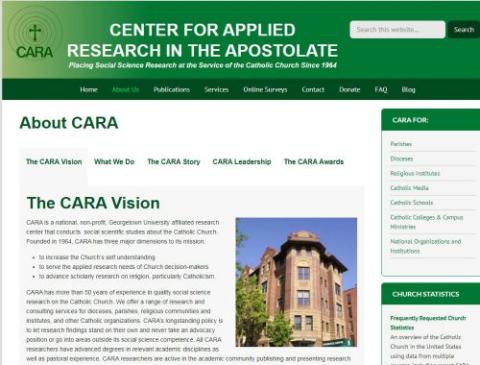
Screenshot of CARA's "about" page
Deacon Bernie Nojadera, director of the U.S. bishops' Secretariat for Child and Youth Protection, called Gautier his "go to person" when it came to data collection on abuse issues. "I'm not a numbers person or a statistician, but I would call Mary, apologize and say, 'Look, I have reporters calling me; can you help explain this to me again?' " Nojadera said with a laugh. "And with all her kindness and patience, she would. Once I called her and found out she was in Australia, but I still got an email from her. She was always reliable, and we knew what we were getting was going to be quality work that we could count on."
Abuse data essential
Nojadera, who has more than two decades of experience in child protection, said that in an earlier era before research on abuse allegations was collected from dioceses and other Catholic institutions, the church lacked a key tool in understanding, preventing and responding to abuse. Over the past 15 years, research from CARA and the John Jay College of Criminal Justice, which examined the nature and scope of the crisis from 1950 until 2002, has been indispensable. "Not only the bishops but the church as a whole is really trying to change the culture around this and find ways to protect and to heal," Nojadera said. "Having these numbers gives us a more scientific way to do that."
Diocesan leaders also credit Gautier with being able to deliver a difficult message. Mark Mogilka, who retired as the director of stewardship and pastoral services in Green Bay, Wisconsin, after three decades in the diocese, admired this trait. "She was warm and positive, but she was always willing to speak tough truths to key leaders," Mogilka said. "Mary was very disciplined when it came to saying what the data did and did not say. That meant sometimes there were bishops and others who labeled her research 'gloom and doom' or not helpful. There were church leaders who practiced denial, and who still are, but Mary always responded professionally. Her statistics were solid."
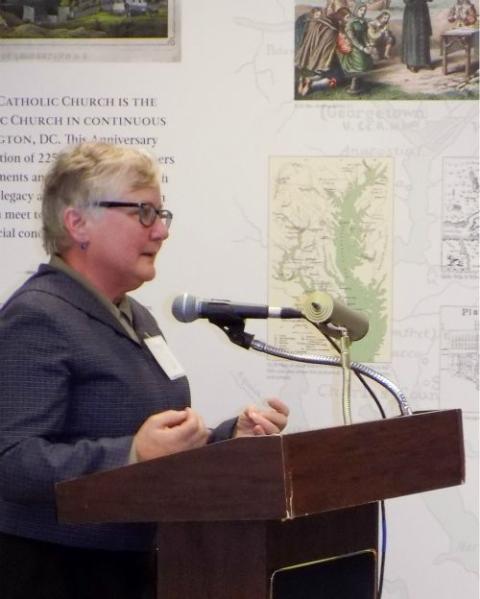
Mary Gautier speaks at her retirement event Oct. 28. (Courtesy of CARA)
Mogilka worked with Gautier on an emerging models of pastoral leadership project, funded by the Lilly Endowment. Her research was critical to helping the diocese and others across the country think through the delicate art of reorganizing parishes. "I've done leadership workshops in over 50 dioceses, and there was not a single presentation that I've given where I didn't cite research that Mary Gautier has done to provide a solid foundation and credibility from which to speak," Mogilka said.
William D'Antonio, a researcher and retired sociology professor at the Catholic University of America, collaborated with Gautier on various projects over the years, including American Catholics in Transition, a multi-series volume that provided survey data from 1987 to 2011 on a range of diverse topics such as Catholics' views on church authority, women's roles in the church, millennials, and how Latino immigrants are shaping the church. By his own description, D'Antonio was at times a vocal critic of the hierarchy, but he expressed appreciation for how Gautier operated at the highest levels of the church. "Mary had a good way with the bishops," D'Antonio said. "I was more willing to be aggressive, and some of my early articles agitated the bishops. Mary was much smoother. So I think in some ways she had a better impact. Bishops would call on her to make a major speech, and she would manage to get key points across rather than aggravating people. That was an important contribution. Bishops would be willing to ask questions rather than condemn the paper."
After decades of crunching numbers, a professional life of seeing the stories and deeper meaning in data, Gautier is retiring both grateful and hopeful. She will stay on as an occasional contractor with CARA and still serve on the board of Liturgical Press. Earlier this week, CARA hosted a dinner in her honor attended by dozens of friends and colleagues.
"I couldn't wait to get to work every day," Gautier said. "It was all tremendously fun and interesting. We have such a big, beautiful, vibrant church, and there is so much growth yet to be discovered. For God's sake, quit ragging on these millennials! They want to be part of the church, too, in their own way. We're often our own worst enemies complaining that things aren't what they used to be in the good old days. But our church is strong and resilient."
[John Gehring is Catholic program director at Faith in Public Life and author of The Francis Effect: A Radical Pope's Challenge to the American Catholic Church.]
